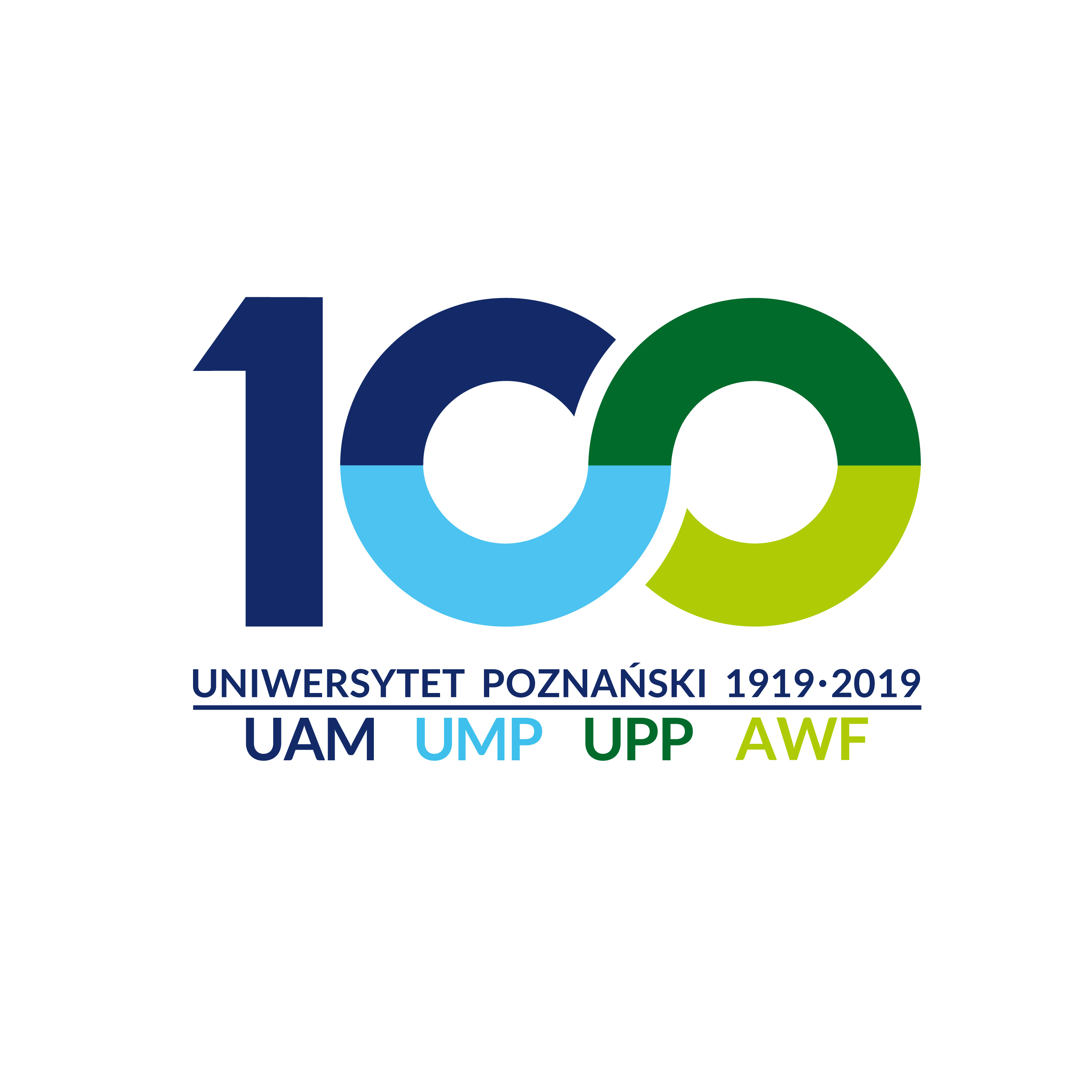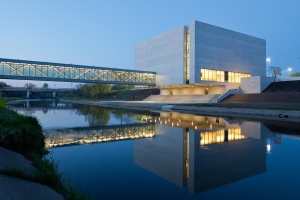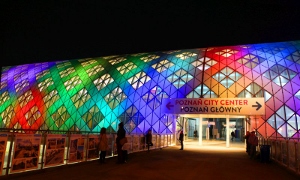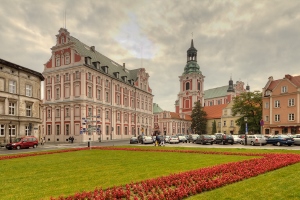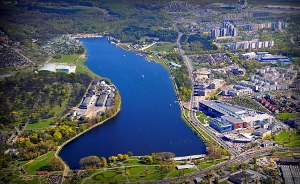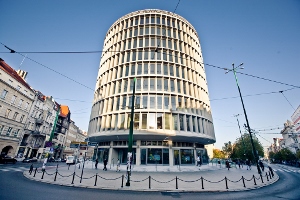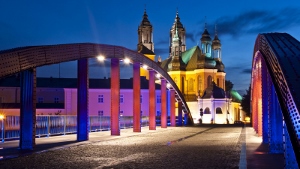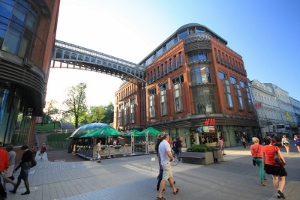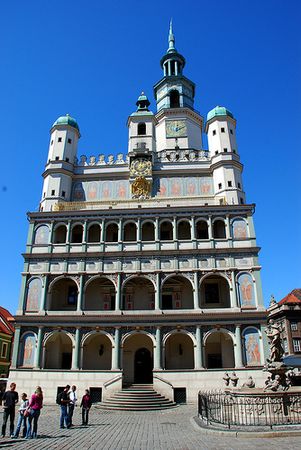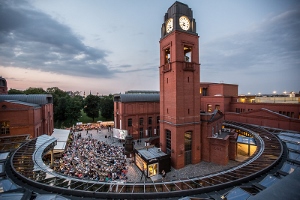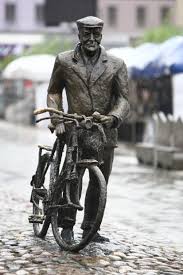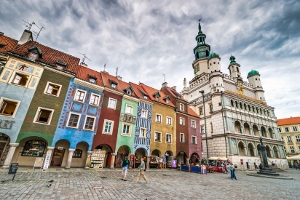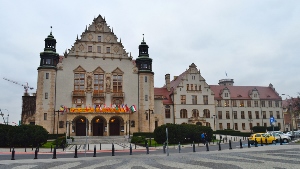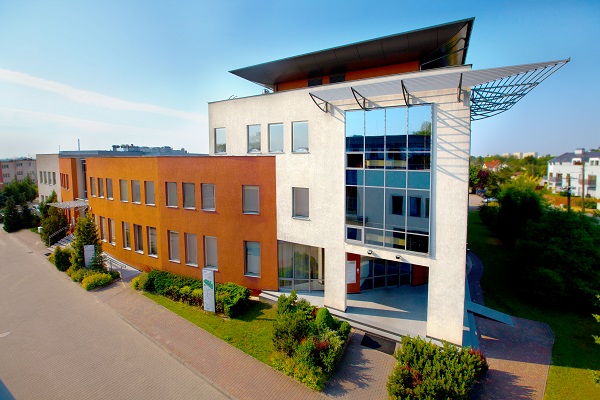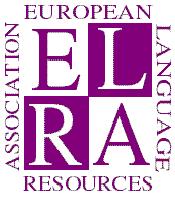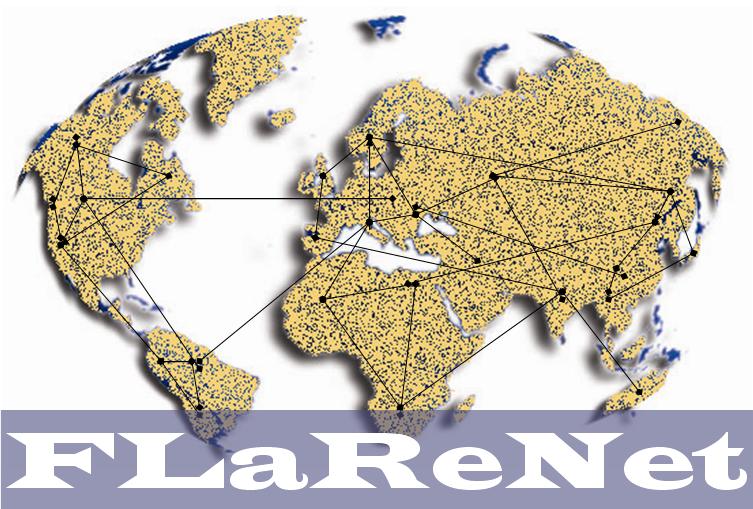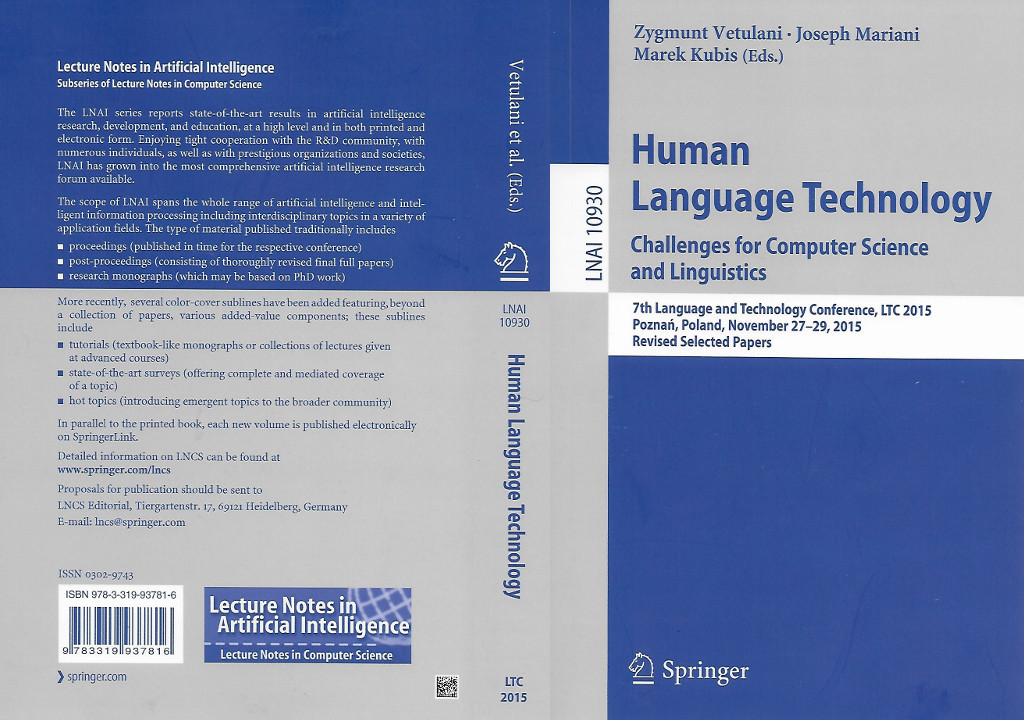|
|
| Day 1: May 17, 2019 |
| Session: eHumanities as a Challenge for Linguistics and Language Technologies |
| 12:20 - 13:15 |
| Frame-based annotation in the corpus of synesthetic metaphors
| Magdalena Zawisławska
|
| Crawling in Reverse -- Lightweight Targeted Crawling of News Portals
| Balázs Indig, Tibor Kákonyi and Attila Novák |
| Detecting word level metaphors in Polish | Aleksander Wawer, Małgorzata Marciniak and Agnieszka Mykowiecka |
| Session: Machine translation |
| 14:30 - 15:45 |
| Automatic translation of the CLEVR dataset into Polish
| Maciej Kocot and Aleksander Smywiński-Pohl |
| Output Polishing Methods for any to English Machine Translation
| Davood Mohammadifar and Gholamreza Ghassem-Sani |
| Session: Language resources and tools 1 |
| 14:30 - 15:45 |
| Towards an Automatic Rule-Based Disambiguation Algorithm for Polish
| Zbigniew Kaleta |
| Towards TreeLex++: a Syntactico-Semantic Lexical Resource for French
| Anna Kupsc, Pauline Haas, Rafael Marin and Antonio Balvet |
| PolEval 2019 --- the next chapter in evaluating Natural Language Processing tools for Polish | Łukasz Kobyliński, Maciej Ogrodniczuk, Jan Kocoń, Michał Marcińczuk, Aleksander Smywiński-Pohl, Krzysztof Wołk, Danijel Koržinek, Michał Ptaszyński, Agata Pieciukiewicz and Paweł Dybała |
| Session: Prosody Tools |
| 16:15 - 17:55 |
| Search for Inter-Pausal Units: application to Cheese! corpus
| Brigitte Bigi and Béatrice Priego-Valverde |
| Annotation Pro + CLARIN-PL Align: automatic segmentation and transcription module for desktop uses | Katarzyna Klessa and Danijel Koržinek
|
| An Online Tutorial Tool for Acoustic Prosody Visualisation
| Dafydd Gibbon |
| A set of tools for analysis of speech fundamental frequency | Jolanta Bachan |
| Session: Information retrieval / Information extraction 1 |
| 16:15 - 17:55 |
| Confidence order for joint extraction of entities and relations | Shuo Qiu and Yves Lepage |
| Sentiment Embedded Representation Learning Using Auto-Encoders | Behnam Sabeti and Gholamreza Ghassem-Sani |
| Polish Word Association Prediction | Krzysztof Wróbel |
| Day 2: May 18, 2019 |
| Session: Computational semantics |
| 8:15 - 9:30 |
| Semantico-formal resolution of analogies between sentences
| Yves Lepage |
| Iterative training for unsupervised word embedding mapping | Sijia Yu and Yves Lepage |
| Towards Automated Extraction of Translational Equivalents from Interlingual Synset Relations | Maciej Piasecki, Roman Dyszlewski and Ewa Rudnicka |
| Session: Information retrieval / Information extraction 2 |
| 8:15 - 9:30 |
| Multi-Word Expressions Extraction for Clinical Domain | Srishti Singh, Girish Nath Jha, Nganthoibi Oinam, Diwakar Mishra and Pinal Patel |
| Adaptive Deep Ensemble Learning for Tone Feature Pattern Classification | Udoinyang Inyang and Moses Ekpenyong |
| Thai Named Entity Tagged Corpus Annotation Scheme and Self Verification | Kitiya Suriyachay, Thatsanee Charoenporn and Virach Sornlertlamvanich
|
| Session: Demo session |
| 9:30 - 10:50 |
| Logging and Mapping Keystroke with Translog-II and the CRITT TPR-DB
| Michael Carl |
| Demo of XTM the leading Cloud based TMS | Andrzej Zydroń and Mikołaj Lauer |
| Filtering multi-levels annotated data | Brigitte Bigi |
| Annotation and annotation mining tools for analyzing speech prosody in the Polish-German Borderland database | Katarzyna Klessa, Maciej Karpiński and Brigitte Bigi |
| Katana and Grand Guru: a Game of the Lost Words | Alice Millour, Marianne Grace Araneta, Ivana Lazić Konjik, Annalisa Raffone, Yann-Alan Pilatte and Karën Fort |
| Demonstrating ConstruKT, a text annotation toolkit for generalized linguistic contructions applied to communication spin | Anna Koroleva and Patrick Paroubek |
| CRAFT and ProsodyPy: Online and Offline Tools for Prosodic Acoustic Analysis | Dafydd Gibbon |
| TSCC as a tool for lexical structure studies in application to literary output | Zygmunt Vetulani, Marta Witkowska, Marek Kubis |
| Ontology Repository Tool for effective development and deployment of wordnet based ontologies | Jacek Marciniak |
| Session: Human Language Technologies in Crisis and Emergency Management / Applications 1 |
| 11:20 - 12:35 |
| Developing a Virtual Reality Wildfire Simulation to Analyze Human Communication and Interaction with a Robotic Swarm During Emergencies | Patricia Chaffey, Ron Artstein, Kallirroi Georgila, Kimberly Pollard, Setareh Nasihati Gilani, David Krum, David Nelson, Kevin Huynh, Alesia Gainer, Seyed Hossein Alavi, Rhys Yahata and David Traum |
| Implementation of current state-of-the-art technology for obtaining a working Dialogue Agent | Daniel Oklesiński and Wojciech Jaworski |
| Goal-oriented dialog systems and Memory : an overview | Léon-Paul Schaub and Cyndel Vaudapiviz |
| Session: Language resources and tools 2 |
| 11:20 - 12:35 |
| Evaluation of basic modules for isolated spelling error correction in Polish texts | Szymon Rutkowski |
| Legal aspects of the language technology development in the context of the European digital economy | Ilya Ilin |
| Session: Applications 2 |
| 14:20 - 16:00 |
| Breaking the Linguistic Barriers to Access the Internet | Gabriella Schittek, Jean-Jacques Sahel and Sarmad Hussain |
| Voice conversion using deep adversarial learning | Hubert Siuzdak and Jakub Gałka |
| System for rapid classification and analysis of financial reports | Matej Martinc, Martin Žnidaršič and Senja Pollak |
| Towards a User-Oriented Infrastructure - CLARIN-PL Language Technology Centre | Ewa Rudnicka, Tomasz Naskręt, Jan Wieczorek and Marcin Oleksy |
| Session: Information retrieval / Information extraction 3 |
| 14:20 - 16:00 |
| Exploiting Semantic Heads to Retrieve Compatible Nominal Expressions | Simone Magnolini, Bernardo Magnini and Manuela Speranza |
| First Steps in Recognizing Relational Entailment -- Experimental Corpus and Baselines | Martin Víta and Jakub Klímek |
| Visualisation of document similarities based on word embedding models for Polish | Tomasz Walkowiak and Mateusz Gniewkowski |
| Day 3: May 19, 2019 |
| Session: Less-resourced languages |
| 8:45 - 10:25 |
| Building capacity for community-led documentation in Erakor, Vanuatu | Ana Krajinović, Rosey Billington, Lionel Emil, Gray Kaltap̃au and Nick Thieberger
|
| LSTM based Language Models for Wolof | Cheikh Bamba Dione |
| Habitual aspect as a property of text spans | Annika Tjuka, Lena Weißmann and Kilu von Prince |
| Getting to know the speakers: a survey of a non-standardized language digital use | Alice Millour |
| Session: Processing Emotions, Decisions and Opinions 1 |
| 8:45 - 10:25 |
| Prosodic Features Classification of Ibibio Affects | Moses Ekpenyong, Nnamso Umoh, Ememobong Udoh and Aniekan Ananga |
| Using book dialogs to extract emotions from texts in Polish | Paweł Skórzewski
|
| Deep Learning vs. Classic Models on a New Uzbek Sentiment Analysis Dataset | Elmurod Kuriyozov, Sanatbek Matlatipov, Miguel A. Alonso and Carlos Gómez-Rodríguez |
| Session: Open Challenge for Correcting Errors of Speech Recognition Systems |
| 12:25 - 12:50 |
| Open Challenge for Correcting Errors of Speech Recognition Systems | Marek Kubis, Zygmunt Vetulani, Mikołaj Wypych and Tomasz Ziętkiewicz |
| Session: Turkic and other Agglutinative Languages as a Challenge for Language Industry |
| 14:00 - 15:40 |
| Design and development of preprocessing tools for media-corpus of the Kazakh language | Madina Mansurova, Gulmira Madiyeva, Nurgali Kadyrbek and Zhantemir Yermekov
|
| A prolog format of Uzbek WordNet’s entries | Khabibulla Madatov |
| Uzbek language processing on the Multi-language modeled technology for computer translator | Mersaid Aripov, Muftah Khakimov and Sanatbek Matlatipov |
| Session: Processing Emotions, Decisions and Opinions 2 |
| 14:00- 15:40 |
| Layer adaptation for transfer of expressivity in speech synthesis | Ajinkya Kulkarni, Vincent Colotte and Denis Jouvet
|
| Corpus Creation and Baseline System for Aggression Detection in Telugu-English Code-Mixed Social Media Data | Koushik Reddy Sane, Sushmitha Reddy Sane, Sairam Kolla and Radhika Mamidi |
| Recognition of emotions, valence and arousal in large-scale multi-domain text reviews | Jan Kocoń, Arkadiusz Janz, Piotr Miłkowski, Monika Riegel, Małgorzata Wierzba, Artur Marchewka, Agnieszka Czoska, Damian Grimling, Barbara Konat, Konrad Juszczyk, Katarzyna Klessa and Maciej Piasecki
|
| Lexicalised Morpho-Syntactic Patterns in Sentiment Polarity Recognition for Polish | Joanna Turowska, Arkadiusz Janz, Maciej Piasecki and Jan Wieczorek
|
| Session: Parsing / Morphology |
| 16:30- 18:10 |
| Improving the Accuracy of a Persian Neural Dependency Parser using Ezafe Construction | Maryam Gholamalitabarfirouzjaei, Ahmad Haji Mohammadkhani and Gholamreza Ghassem-Sani |
| Morphological Synthesis and Analysis of Georgian Words | Irakli Kardava, Nana Gulua, Jemali Antidze and Beka Toklikishvili |
| New Transition Systems for Dependency Parsing of Sentences with Non-Projective Relations | Maryam Gholamalitabarfirouzjaei, Aliakbar Nafar and Gholamreza Ghassem-Sani |
| Combined morphological analyzer of the Kazakh language based on ontological modeling | Altynbek Sharipbay, Assel Mukanova, Gaziza Yelibayeva, Altanbek Zulkhazhav and Bibigul Razakhova |
|
EXHIBITIONS AND SPECIAL EVENTS
|
|
Special events. Besides the standard conference presentation of
papers, the Organizers are open to various kinds of initiatives (expos,
demos, satellite workshops, panels, awards). A program of special
events is now under construction. You are welcome to contact us with
your suggestions.
Until now the following LTC affiliated workshop have been pre-announced:
|
Prosody Tools Workshop (PTW 2019)
|
|
|
An event at: 9th Language & Technology Conference: Human Language Technologies as a Challenge for Computer Science and Linguistics (http://ltc.amu.edu.pl/)
May 17-19, 2019, Poznań, Poland.
Workshop organizers
Chairs:
• Katarzyna Klessa, Adam Mickewicz University in Poznań, Chair klessa@amu.edu.pl
• Dafydd Gibbon, Bielefeld University, Chair, gibbon@uni-bielefeld.de
Program Committee:
Jolanta Bachan, Adam Mickewicz University in Poznań
Brigitte Bigi, Aix-Marseille Université
Anders Eriksson, Stockholm University
Dafydd Gibbon, Bielefeld University
Maciej Karpiński, Adam Mickewicz University in Poznań
Katarzyna Klessa, Adam Mickewicz University in Poznań
Mietta Lennes, FIN-CLARIN, University of Helsinki
Zofia Malisz, Department of Speech, Music and Hearing, KTH, Stockholm
Krzysztof Marasek, Polish-Japanese Academy of Information Technology, Warsaw
Agnieszka Wagner, Adam Mickewicz University in Poznań
Marcin Włodarczak, Stockholm University
The objective of the workshop is to present and discuss tools for the analysis of speech prosody The workshop is intended in some ways to be a followup event from the Aix-en-Provence TRASP 2013 workshop (http://www.lpl-aix.fr/~trasp/). The tools may be new developments or established tools, and they may be highly specialised for specific types of analysis, or of general interest. The focus will be on tools that are freely available and easily accessible for all interested researchers, and in some cases open source, including both online and offline tools. The workshop presentations will take the form of software demonstrations and discussions of the motivation for the software, or case studies featuring results obtained with the software. The organisers hope for a free exchange of ideas, with the aim of increasing awareness of available free software, and with the medium and long term aim of adding to the range of open source tools in international repositories.
We invite submissions on tools supporting prosodic investigation at all stages of speech data collection, processing, analysis, interpretation and practical uses (e.g. for the needs of psycholinguistics, sociolinguistics, speech therapy, speech technology, teaching practice). Consequently, the workshop contributions can for example (but not exclusively) provide reports on tools for:
• examining the production and perception of prosody;
• approaches to speech rhythm and timing analysis;
• approaches to speech tone, pitch accent and intonation analysis;
• study of individual prosodic variation;
• speech prosody studies from the perspective of:
- phonetic-acoustic phenomena;
- articulatory processes;
- perception-based studies;
• speech annotation and annotation mining;
• automatizing the procedures in prosodic analysis;
• advantages and disadvantages of different pitch trackers
• issues in interoperability, re-usability, and collaborative development of the tools for prosody.
Submission
Submissions should include a description of the tool, with specifications of use cases, types of data handled, the user interface, input and output, and the methods provided by the tool. If possible, a link for accessing the tool should be provided.
Submission details soon
Access to the program
The access to the program of both the main conference and all workshops (as well as the social program) is the same for all LTC/WORKSHOPS participants.
IMPORTANT DATES/DEADLINES
Deadline for submission of papers for review: March 27, 2019
Acceptance/Refusal notification: April 4, 2019
Deadline for submission of final versions of accepted papers: April 12, 2019
Conference (all events): May 17-19, 2019
More about PTW 2019 at http://prosodytools.amu.edu.pl
|
The 6th LTC Workshop on Less-Resourced Languages (LRL 2019)
|
An event at: 9th Language & Technology Conference: Human Language Technologies as a Challenge for Computer Science and Linguistics (http://ltc.amu.edu.pl/)
May 17-19, 2019, Poznań, Poland.
Chairs: Dorothee Beermann (Norwegian University of Science and Technology), Laurent Besacier (Grenoble Alpes University, France) and Claudia Soria (CNR-ILC, Italy)
Contact: claudia.soria@ilc.cnr.it
WORKSHOP TOPICS
We invite original papers that address the particular needs and requirements of less-resourced languages. We in particular welcome papers on the computational processing of less resourced languages addressing the following topics. We also welcome papers on language revitalisation and literary development.
Induction of multilingual resources for LRL
Morphological Paradigm Learning for LRL
Corpus building for LRL
Dialect processing for LRL
Spoken language processing for LRL
Code Switching in LRL
Deep Learning for LRL
Computer-aided work with LRL
Information retrieval on Social Networks for LRL
Linguistic Resources for LRL
Spell-check and automatic corrections for LRL
Descriptive Studies on LRL
Community approaches to revitalisation and literary development
IMPORTANT DATES/DEADLINES
Deadline for submission of papers for review: March 26, 2019
Acceptance/Refusal notification:
April 8, 2019
Deadline for submission of final versions of accepted papers: April 15, 2019
LRL Workshop: May 19, 2019
Conference (all events): May 17-19, 2019
PROGRAM COMMITTEE
Gilles Adda (LIMSI-CNRS, France)
Dorothee Beermann (Norwegian University of Science and Technology, Norway)
Delphine Bernhard (LILPA, Strasbourg University, France)
Laurent Besacier (Université Joseph Fourier, France)
Nicoletta Calzolari (CNR-ILC, Italy)
Jeremy Evas (Cardiff University, Wales, United Kingdom)
Mikel Forcada (Universitat d’Alacant, Spain)
Dafydd Gibbon (Universität Bielefeld, Germany)
Steven Krauwer (CLARIN, The Netherlands)
Anne-Laure Ligozat (ENSIIE / LIMSI-CNRS, France)
Girish Nath Jha (Jawaharlal Nehru University, India)
Michael Maxwell (University of Maryland, CASL, United States of America)
Joseph Mariani (LIMSI-CNRS, France)
Maite Melero (UPF, Catalonia, Spain)
Alice Millour (Université Paris-Sorbonne, France)
Stelios Piperidis (ILSP, Greece)
Laurette Pretorius (University of South Africa, South Africa)
Gábor Prószéky (Magyar Tudományos Akadémia, Hungary)
Georg Rehm (DFKI, Germany)
Sakriani Sakti (NAIST, Japan)
Kepa Sarasola Gabiola (Euskal Herriko Unibertsitatea, Spain)
Kevin Scannell (St. Louis University, United States of America)
Virach Sornlertlamvanich (Sirindhorn International Institute of Technology [SIIT], Thammasat University, Thailand)
Marko Tadic (University of Zagreb, Faculty of Humanities and Social Sciences, Croatia)
Nick Thieberger (University of Melbourne / ARC Centre of Excellence for the Dynamics of Language, Australia)
Menzo Windhouwer (Meertens Institute, KNAW, The Netherlands)
PAPER SUBMISSION
The conference accepts papers in English only. Papers (5 formatted pages in the conference format) are due by March 20, 2019 (midnight, any time zone) and should not disclose the authorship in any manner. In order
to facilitate submission we have decided to reduce the formatting requirements as much as possible at this stage. Please, have a look at www.ltc.amu.edu.pl (Paper Submission section).
Important Notice: Make sure to include the keyword "LRLWorkshop" among the paper’s keywords.
A copy of the submitted paper must also be sent to claudia.soria@ilc.cnr.it, indicating "RL19 Workshop submission" as the subject of the mail.
PUBLICATION POLICY
Accepted papers will be published in the conference proceedings (hard copy, with ISBN number) and on CD-ROM. Publication requires full electronic registration and payment of the conference fee (full registration) by at least one of the co-authors in due time (dates will be presented at the conference site). One registration fee entitles publication of one paper.
Proceedings will be published by Wydawnictwo Nauka i Innowacje sp. z o.o. indexed by Polish Ministry of Higher Education.
FEES
LRL is an integral part of the LTC. Fees and payment procedures are the same for general LTC and workshop participants, and they cover participation in the general LTC program. Notice: the workshop is free for participants registered to the general LTC. Single registration covers only one paper presentation (general LTC or workshops) (cf. the Publication Policy section in case of more than one submitted paper).
REGISTRATION
Only electronic registration will be possible. Details will be published at www.ltc.amu.edu.pl.
OTHER
Please note that remaining important information on the workshop and the general conference is or will be provided at the workshop web site http://www.ilc.cnr.it/lrl2019/submissions.htm (under preparation) and at the conference site www.ltc.amu.edu.pl.
|
Workshop on Turkic and other Agglutinative Languages as a Challenge for Language Industry (TALC 2019)
|
Theme: This workshop welcomes the submissions dedicated to resources and tools existing for Turkic and other agglutinative languages. We intend to launch systematic international work to enhance development of human language technologies for these languages starting with creation of a map of already existing digital language data and software. The preference will be given to freely available resources and tools. The organizers are looking forward to receiving contributions that will be presented in the form of software or data demonstrations. The goal of the workshop is also to integrate the community of researchers focusing on the empirical analyses of Turkic and other agglutinative languages and to stimulate scientific discussions regarding the development of language technologies for these languages.
Language: English
Topics:
Experience in the production, validation and distribution of Language Resources and Tools for aglutinative languages
LRT map for Turkic languages
Morphology, syntax and semantics for agglutinative languages
Difficulties in processing agglutinative languages related to writing systems and phonological processes (assimilation, lenition)
Experience in the evaluation of Language Technology for agglutinative languages
Infrastructures and policies for making available LR and LT for Turkic languages
Translation related issues for agglutinative languages
Language corpora for agglutinative languages
TALC 2019 Organising and Program Committee:
Gulayhan Aqtay (Poland, Kazakhstan) – Chair akgul@amu.edu.pl
Paweł Dybała (Poland) – Co-Chair paweldybala1@gmail.com
Yves Lepage (Waseda, Japan) - Co-Chair yves.lepage@waseda.jp
Nergis Biray (Turkey)
Henryk Jankowski (Poland)
Annette Herkenrath (Germany)
Laszló Károly (Sweeden)
Gayrat Matlatipov (Uzbekistan)
Habibula Madatov (Uzbekistan)
Zygmunt Vetulani (Poland)
Inscriptions and fees: as for the general LTC (detailed instruction soon) (all LTC related events are open for the workshop participants)
Paper submission: as for the general LTC (EasyChair) (detailed instructions soon)
Publications: see the LTC Publication Policy section, accepted papers will be published in the LTC Proceedings
Reviewing: according to the general reviewing policy for LTC Workshops
Program: The workshop will comprise presentations (including keynote talks) and a panel session. All the LTC events (general tracks, workshops and social program) will be open for TALC participants
IMPORTANT DATES/DEADLINES
Deadline for submission of papers for review: March 27, 2019
Acceptance/Refusal notification: April 2, 2019
Deadline for submission of final versions of accepted papers: April 12, 2019
LRL Workshop: May 19, 2019
Conference (all events): May 17-19, 2019
Contact: Gulayhan Aqtay or Zygmunt Vetulani
|
Workshop on Human Language Technologies in Crisis and Emergency Management (HLTCEM 2019)
|
This workshop targets all researchers and practitioners interested in the application of language technologies to support the response to and management of crisis and emergency situations. Linguists, computer scientists and - last but not least - first responders and relief workers are welcome to contribute and to interact during the workshop. We solicit contributions addressing both practical and theoretical aspects of developing and applying language technology for crisis and emergency situations. State of the art application reports as well as visionary contributions to the workshop discussion are welcome.
By crises and emergency situations we mean incidents at varying scale, including smaller ones such as house fires, traffic accidents, local floods, hazardous material disposal, etc. or medium-size to large ones, such as natural or manmade disasters, terrorist attacks, incidents at large-scale social or sports events, etc. All such incidents pose safety risks to responders and public, and require that the response is carried out as efficiently as possible, both within and across country borders. The workshop welcomes original contributions addressing any aspect of the development and use of language technology that is aimed to support the crisis and emergency management (CEM) by any of the organizations involved in the response to and relief of such a situation, including the fire brigades, police, medical services, humanitarian organizations etc.
PROGRAM COMMITTEE:
Ivana Kruijff-Korbayova (DFKI, Germany) (Chair), contact: hltcem2019@dfki.de
Dafydd Gibbon, Bielefeld University, Germany
Jakub Gorczyński, Polish National Police, Poland
Muhammad Imran, Qatar Computing Research Institute, Hamad bin Khalifa University, Qatar
Anastasios Karakostas, Information Technologies Institute, Centre for Research and Technology Hellas, Greece
Claudio Rossi, Links Foundation, Italy
Hauke Speth, Institute for Firebrigade and Rescue Technology, Germany
Zygmunt Vetulani, Adam Mickiewicz University in Poznań, Poland (Co-chair)
Leo Wanner, Universitat Pompeu Fabra, Spain
Christian Willms, Talking Robots Group, DFKI, Germany
WORKSHOP TOPICS
The workshop includes but is not limited to the following topics applied to language technology and natural language processing for CEM:
Requirements analysis and relevant use cases
Text, speech and multilingual corpora
Linguistic data annotation and analysis
Team communication analysis and processing
Speech-based and multimodal dialogue
Human-robot interaction
Social media processing
Language data analytics
Information extraction
Question answering
Automatic documentation and reporting
IMPORTANT DATES/DEADLINES
Deadline for submission of papers for review: March 31, 2019
Acceptance/Rejectin notification:
March 5, 2019 March 10, 2019
Deadline for submission of final versions of accepted papers:
April 15, 2019
Conference (all events): May 17-19, 2019
PAPER SUBMISSION
The HLTCEM 2019 Workshop accepts papers in English only. Submitted texts should not disclose the author(s) in any manner. Size, format and templates are the same as for the general LTC (see the Paper Submission Section; above). Papers should be submitted using EasyChair. In addition to the submission through EasyChair an email containing the paper title, authors and abstract must be sent to the HLTCEM 2019 Workshop chair to the email address hltcem2019@dfki.de and to the LTC organizers to the email address ltc19@amu.edu.pl. Please use "HLTCEM 2019 submission" in the subject of your email and "HLTCEM" as a key word (both in the EasyChair form and in the paper itself).
PUBLICATION POLICY
Accepted papers will be published in the conference proceedings (hard copy, with ISBN number) and on CD-ROM. Publication requires full electronic registration and payment of the conference fee (full registration) by at least one of the co-authors in due time (dates will be presented at the conference site). One registration fee entitles publication of one paper.
Proceedings will be published by Wydawnictwo Nauka i Innowacje sp. z o.o. indexed by Polish Ministry of Higher Education.
FEES
The HLTCEM workshop is an integral part of the LTC. The LTC fees and payment procedures apply also to the HLTCEM workshop participants. The fee covers participation in the general LTC program as well as this and any other workshop. Note: A single registration covers only one paper presentation either at the (general LTC or in a workshop) (cf. the Publication Policy section in case of more than one submitted paper).
REGISTRATION
Only electronic registration is possible. See www.ltc.amu.edu.pl for details about registration. (soon).
|
Workshop on eHumanities as a Challenge for Linguistics and Language Technologies
|
The growing accessibility of various kinds of technologies encourages specialists from various areas of expertise to apply them in their research. Consequently, we observe an increasing need of the dialogue between the providers and the end-users of the technologies. The goal of this workshop is to stimulate the discussion and provide a meeting platform for engineers and specialists in the humanities.
We invite contributions from the domains of technology and the humanities, not limited to linguistics. We particularly welcome non-trivial examples of the impact that Human Language Technology may have (and already has) on various fields of Humanities. Among the best identified areas of HLT applications are: qualitative and qualitative analysis of literary, journalistic, political, scientific, technical, etc. written texts/authors; analysis of audiovisual and multimedia texts; professional translation (translation technology, tools for information retrieval and pre- and post-editing); forensic linguistics (plagiarism detection, author / speaker identification); teaching methodology, psychology, cultural studies and language usage; social media – linguistic, social and cultural aspects. As this list is far from being exhaustive, please consider it open.
We welcome both novel applications of state of the art technologies and novel technologies in application to well identified problems. Vision papers are welcome too.
Chair: Belinda Maia (University of Porto, Portugal), Co-Chairs: Christopher Cieri (LDC, USA) and Janusz Taborek (UAM, Poland)
bhsmaia@letras.up.pt
ccieri@ldc.upenn.edu
taborek@amu.edu.pl
Program Committee
Jolanta Bachan (UAM, Poland)
Belinda Maia (University of Porto, Portugal)
Christopher Cieri (Linguistic Data Consortium, USA)
Łukasz Grabowski (Uniwersytet Opolski, Poland)
Katarzyna Klessa (UAM, Poland)
Marc Kupietz (Institut f. Deutsche Sprache, Mannheim, Germany)
Henning Lobin (Intitut f. Deutsche Sprache Mannheim, Germany)
Jacek Marciniak (UAM, Poland)
Jürgen Neyer (Europa-Universität Viadrina, Germany)
Marek Osiewicz (UAM, Poland)
Georg Rehm (DFKI Berlin, Germany)
Janusz Taborek (UAM, Poland)
Zygmunt Vetulani (UAM, Poland)
Marta Witkowska (UAM, Poland)
PROPOSED WORKSHOP DATES/DEADLINES
Deadline for submission of papers for review: March 27, 2019
Acceptance/Refusal notification: April 2, 2019
Deadline for submission of final versions of accepted papers: April 12, 2019
Conference (all events, incl. workshops): May 17-19, 2019
>!--MORE DETAILS SOON-->
|
The Third Workshop on Processing Emotions, Decisions and Opinions (EDO 2019)
|
Theme and motivations
During recent several years Social Infrastructure has become irreversibly
linked to such the Internet and its everyday manifestations, like Social
Networking Services (Twitter, Facebook, etc.). Every second this new
tangible information-based reality provides large amounts of data filled
with 1) emotional expressions, 2) people's opinions on various topics, and
3) their reasoning revealing decision making processes. These three are
also closely related to each other and as such should be studied closely
together.
This, as never before, provides an opportunity for development and
application of natural language processing methods, in particular those
regarding such topics as emotion processing, decision making and opinion
mining.
We would like to invite papers from researchers with the common interests
in knowing more about ourselves and the world we live in by means of
opinion and sentiment analysis, recommendations, Web mining, decision
making, etc. We are also interested in gathering researchers working on
emotions, psychology, sociology or ethics with Natural Language Processing
tools.
We cordially invite experts, researchers and scholars in relevant fields to
share their knowledge and join us in a constructive discussion on these
topics.
Topics of interest include, but are not limited to:
Affect Analysis (and its applications)
Cognitive aspects of decisions and opinions
Decisions and NLP
Ethics and NLP
Knowledge acquisition
Opinion Mining
Pragmatics of decision making
Preference models
Recommendation Systems
Sentiment Analysis
Social Informatics
Text mining techniques
Program
The access to the program of both the main conference and the workshops (as
well as the social program) is the same for all LTC/EDO participants.
Organizers
Paweł Dybała (Chair)
pawel.dybala@uj.edu.pl (Jagiellonian University, Poland)
Michał Ptaszyński (Co-chair)
ptaszynski@cs.kitami-it.ac.jp (Kitami Institute of Technology,
Japan)
Rafał
Rzepka (Co-chair) rzepka@ist.hokudai.ac.jp (Hokkaido University, Japan)
Program Committee
Alladin Ayesh, aayesh@dmu.ac.uk (De Montfort University, UK)
Karen Fort, karen.fort@paris-sorbonne.fr (Sorbonne, France)
Dai Hasegawa, daihasg@gmail.com (Hokkai-Gakuen University,
Japan)
Magdalena Igras-Cybulska, migras@agh.edu.pl (AGH, Poland)
Yasutomo Kimura, kimura@res.otaru-uc.ac.jp (Otaru University of
Commerce, Japan)
Paweł Lubarski, Pawel.Lubarski@cs.put.poznan.pl (Poznań
University of Technology, Poland)
Fumito Masui, f-masui@mail.kitami-it.ac.jp (Kitami Institute of
Technology, Japan)
Mikołaj Morzy, mikolaj.morzy@put.poznan.pl (Poznań University of Technology, Poland)
Koji Murakami, koji.murakami@rakuten.com (Rakuten, USA)
Noriyuki Okumura, okumura@akashi.ac.jp (Otemae University, Japan)
Michał B. Paradowski, michal.paradowski@uw.edu.pl (University of
Warsaw)
Tyson Roberts, tyson@goldengate.net (DeepMind, UK)
Marcin Skowron, marcin.skowron@ofai.at (Johannes Kepler
University, Austria)
Yuzu Uchida (Hokkai-gakuen University, Japan)
Zygmunt Vetulani (Adam Mickiewicz University, Poland)
Katarzyna Węgrzyn-Wolska (Efrei/Esigetel, France)
Adam Wierzbicki (Polish-Japanese Institute of Information
Technology, Poland)
Bartosz Ziółko (AGH, Poland)
Inscription procedure: as for the general LTC (+ cc to workshop
chairs)
Fees: The EDO Workshop is an integral part of the LTC (with
autonomous Program Committee). Fees and payment procedures are the same as
for LTC and cover participation in the general program. Free for
participants registered to the general LTC. Single registration covers only
one paper presentation (cf. the Publication Policy section).
Papers:
The EDO Workshop accepts papers in English only. Submitted texts should not
disclose the author(s) in any manner. Format and templates are the same as
for the general LTC (see the Paper Submission Section; above). Papers
should be submitted using EasyChair
exactly as for the general LTC but copies should also be sent to the EDO
Workshop ) organizers i.e. to: Michał Ptaszyński, Rafał
Rzepka and Paweł Dybała.
Please also put "EDO 2019 submission" as Subject of your mail and
"EDO" as a key word (both in the EasyChair form and in the paper
itself).
Presentation: publication in the LTC proceedings (paper + CD)
More about EDO 2019: cf.
http://arakilab.media.eng.hokudai.ac.jp/LTC9/EDO2019/ABOUT.html (the access
to the program of both the main conference and the workshop (as well as the
social program) is the same for all LTC/EDO participants).
WORKSHOP DATES/DEADLINES
Deadline for submission of papers for review: March 20, 2019
Acceptance/Refusal notification: April 2, 2019 March 10, 2019
Deadline for submission of final versions of accepted papers: April 12, 2019
Conference (all events, incl. workshops): May 17-19, 2019
|
LTC 2019 is located in the Adam Mickiewicz University Library (Biblioteka Uniwersytecka), ul. Ratajczaka 38/40, 61-816 Poznań.
Conference opening session on May 17, 11 a.m. will take place in Collegium Maius (ul. Fredry 10, 7 min. walk from the conference location).
Registration desk will be set in the University Library (opening on May 17, 8 a.m.).
|
| |
|
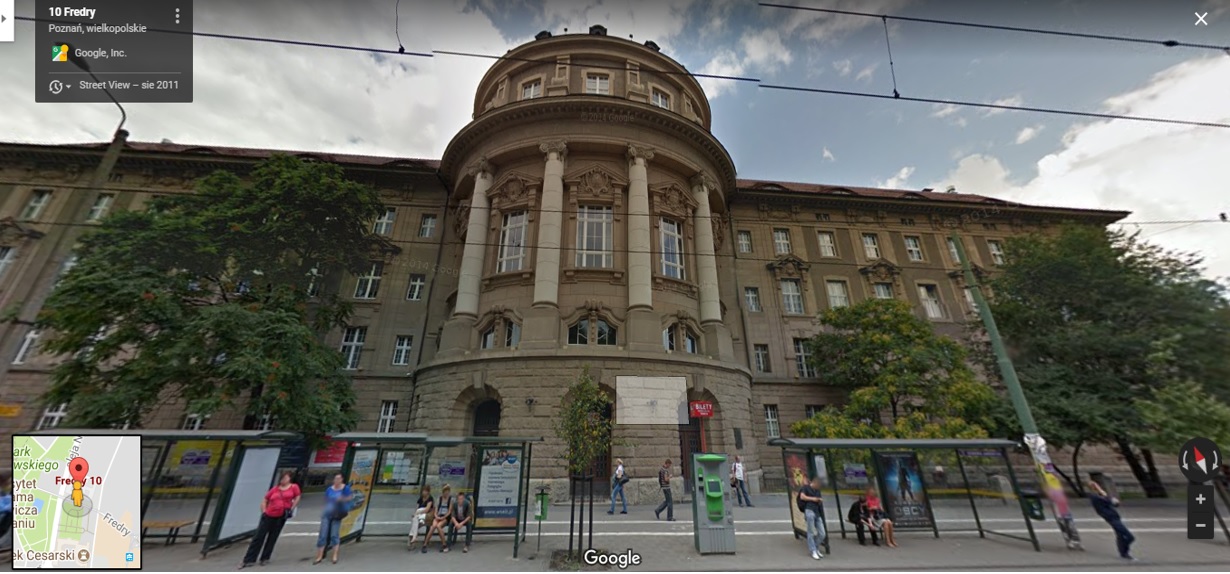
Collegium Maius, Opening Session
ul. Fredry 10
|
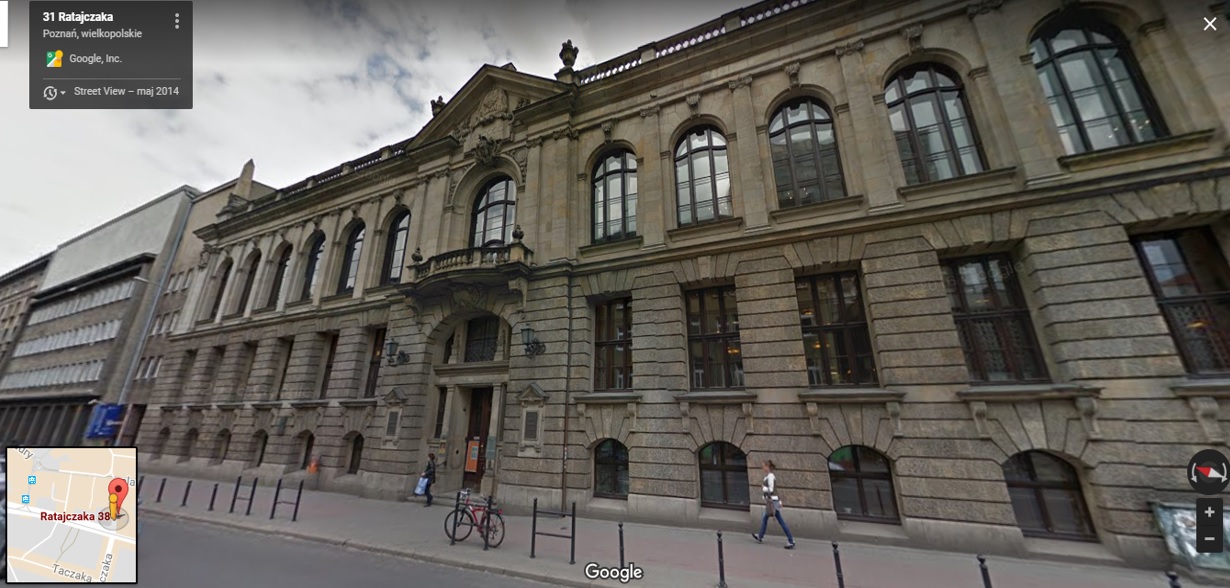
Adam Mickiewicz University Library, Conference place
ul. Ratajczaka 38/40
|
|
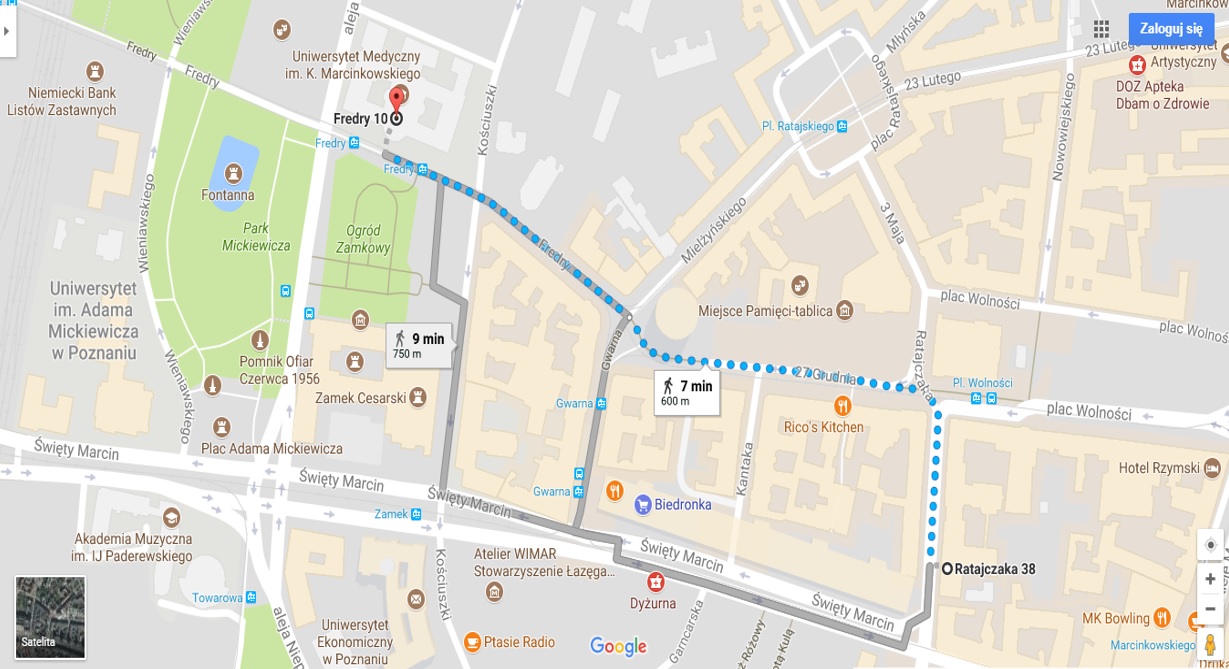
(click the map to see better)
How to get from the University Liberary to Collegium Maius?
|
|
AWARDS FOR THE BEST STUDENT PAPERS
|
|
As at the 2nd, 3rd, 4th, 5th, 6th and 7th Language and Technology Conferences (2005, 2007, 2009, 2011, 2013,2015) special awards will be granted to the best student papers.
The regular or PhD students (on the date of paper submission) are concerned. Co-authored papers will be considered provided that the students'
contributions exceeds 60% and that the main author(s) is (are) student(s)(this fact must be documented by a written declaration signed by
all co-authors).
|
|
In 2005 the Jury, composed of the Program Committee members participating in the conference, awarded this distinction to:
Ronny Melz (University of Leipzig),
Hartwig Holzapfel (University of Karlsruhe),
Marcin Woliński (IPI PAN, Warsaw)
(picture at LTC 2011).
|
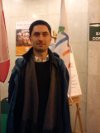 |
|
In 2007 the award for the best student paper was granted to Darja Fišer (University of Ljubljana).
|  |
|
In 2009 two awards were granted: to Mahmoud EL-Haj (University of Essex, UK) (left) and Alexander Pak (LIMSI-CNRS, Orsay, France) (right).
| 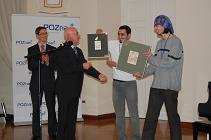 |
|
In 2011 the Jury decided to award three student contributions:
Narayan Choudhary (Jawaharlal Nehru University, New Delhi, India)(left),
Moses Ekpenyong (University of Uyo, Nigeria)(middle) and
Marek Kubis
(Adam Mickiewicz University in Poznań, Poland) (right).
|
 |
 |
 |
|
In 2013 the Jury decided to award: Dominika Rogozińska, IPI PAN Warszawa, Juan Luo (left picture), Waseda University, Japan, and Matea Srebačić (right picture), University of Zagreb, Croatia.
|
 |
 |
|
























































































































